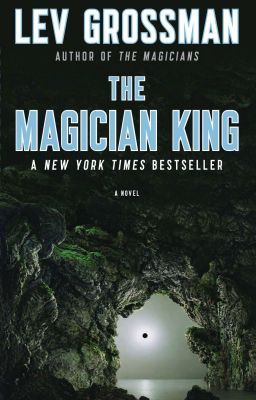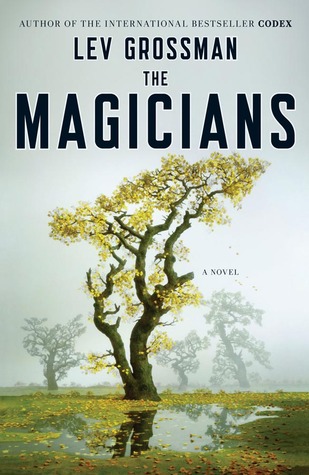Read my thoughts on the first book–The Magicians–here. Warning, may have slight spoilers from the first book.
Summary: Quentin and his friends are now the kings and queens of Fillory, but the days and nights of royal luxury are starting to pall. After a morning hunt takes a sinister turn, Quentin and his old friend Julia charter a magical sailing ship and set out on an errand to the wild outer reaches of their kingdom. Their pleasure cruise becomes an adventure when the two are unceremoniously dumped back into the last place Quentin ever wants to see: his parent’s house in Chesterton, Massachusetts. And only the black, twisted magic that Julia learned on the streets can save them.
The Magician King is a grand voyage into the dark, glittering heart of magic, an epic quest for the Harry Potter generation. It also introduces a powerful new voice, that of Julia, whose angry genius is thrilling.
I was rather apathetic when starting this book due to my lackluster response for the first book, but I was glad I gave the trilogy a second chance. While there were still several issues that I had with the book and now believe it was due just Grossman’s style and choices that I have problems with as opposed to anything else, this sophomore addition to the trilogy was a much stronger read than its introduction.
First of all, there were two storylines in this installment. One followed Quentin and the gang’s adventures in Fillory as well as a quest to help save magic, while the other explained Julia’s backstory as to how she obtained her magical powers and her own brand of devotion to all magic. The wonderful thing about this book is that you could read it and appreciate the separate storylines as different story arcs for two characters or read it as one cohesive story.
Speaking of Julia’s backstory, I found her to be the much more interesting character overall. While she shared many characteristics that Quentin exhibited in the first book—which led me to believe that Grossman just prefered his protagonists cynical and downright trodden by life—she actually had good reason to behave in that manner. She was also the much more dedicated character, willing to do anything to get a glimpse into the world of magic that was denied to her in the conventional sense. Following Julia really made me appreciate her as a character since now I understand her strange choices, and I admire her for her dedication to devote herself so wholly to something that she absolutely believed in. It was that spirit that made me feel like that she was a character that deserved growth and development because she had put so much energy and effort to obtain it.
I also found Julia’s backstory easier to follow in terms of world-building. Maybe because as a reader I was already introduced to the various elements of Fillory and Billbrakes in book 1, but I found through reading Julia’s chapters that I had a better grasp on what types of magic exist in the worlds as well as highlighting the differences between Fillory and Earth. Also Grossman introduced only one or two parts of Fillory as opposed multiple random details of the magical land; consequently I could visualize FIllory and come to understand why it was such a desirable place for many young magicians.
While the first book was all about discovery and laid the foundation for Fillory, this book was essentially one epic quest for all the characters. I appreciated this as it was easier to grasp the overall plot of the book; while I was never quite sure where the fast-paced story would go after its many turns along the way, at least I understand the journey that I was on. This was a vast improvement from the first book where random events just occurred and no explanations were given or plot points were tied together cohesively until the very last pages. The plot itself was much more action-packed here, with plenty of world-hopping that served a purpose: to try to prevent the end of magic.
Speaking of last pages though, my favourite would have to be that ending—it was both powerful and bittersweet. While magic was an exciting thing to have, magic was not the end-all solution to everything and even magic had to obey some greater law out in the universe. There was really a sense of consequence that occurs even with magic, and I think it tied in nicely with the character development that Quentin experienced throughout the books. While he was still a whiny disdainful brat most of the time, at least he was trying to move past that attitude (or marginally improve it so he was only a whiny brat) through this epic quest, allowing him to become more of a redeemable character that I was interested in rooting for.
The themes that Grossman chose to explore were interesting if not clichéd—the idea of what hero really is and how happily ever afters don’t always stack up to one’s imagination. He did not add anything new to the discussion but I think he did solidly try to develop and demonstrate these two themes throughout the book and it became very apparent by the time one reached the last pages.
There are still issues that I have with the book though; Grossman still adds new characters and does not bother developing anyone from the previous one. I don’t think I have learned anything more about Josh or Eliot or Janet, and they are major supporting characters from both books. Plus I think that Grossman thinks that to make the book seem more mature he has to add a lot of unnecessary crude or inappropriate language. There are multiple instances particularly in the latter half of the book where people just could not stop swearing and I was rolling my eyes; instead of sounding cool or mature or tough or whatever effect Grossman was aiming for, the characters just sound like they had a limited vocabulary range.
Still, this was a good bridge and a much worthy contender than the first book. I look forward to finishing the last book in the trilogy.

